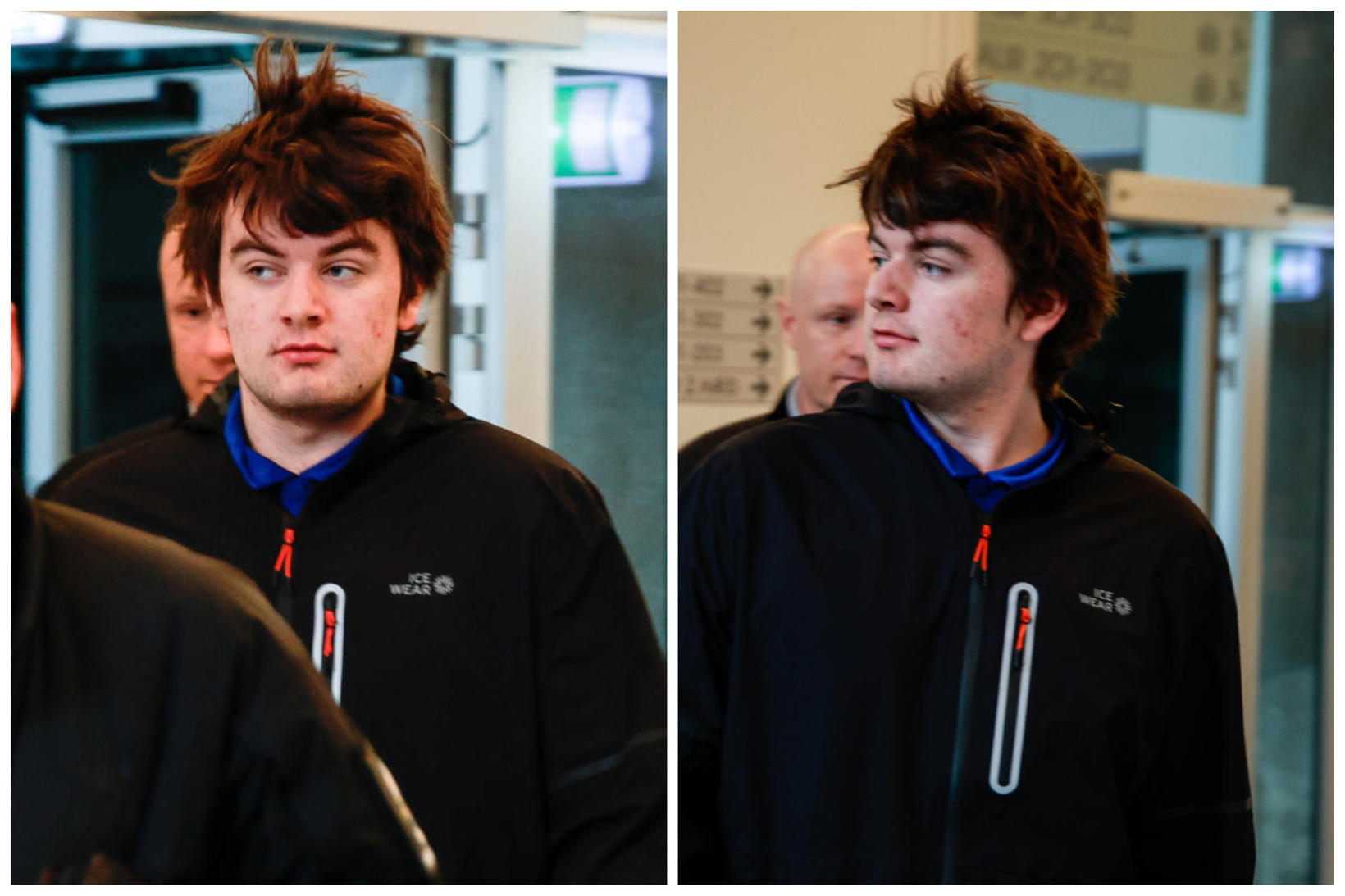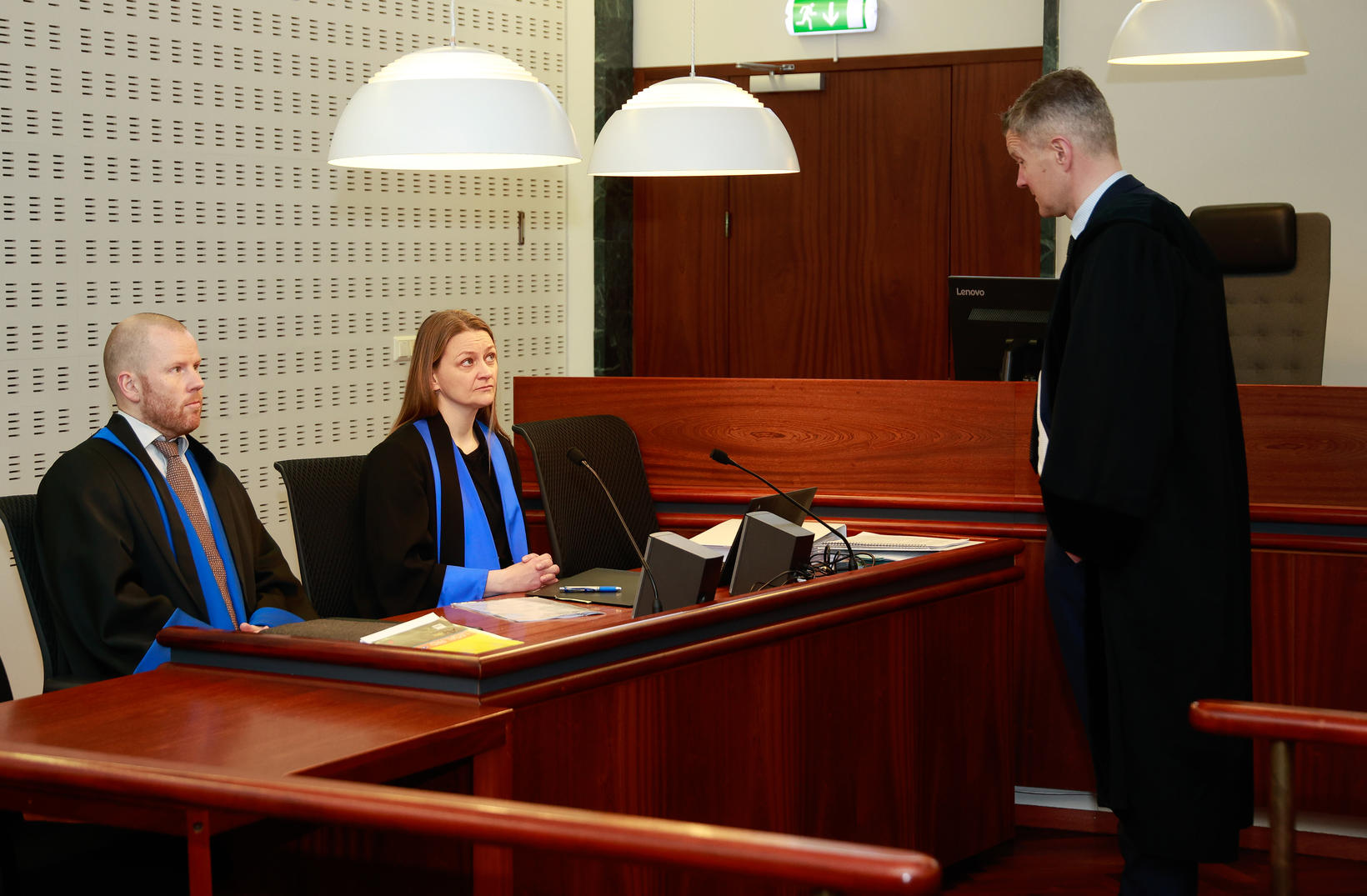The Barðavogur case is now in court
Magnús Aron Magnússon coming to court this morning. He has been charged with murder that took place in Barðavogur in Reykjavík 4th of July last year. mbl.is/Arnþór
A psychologist who conducted a psychiatric evaluation of the mental state and intelligence of Magnús Aron Magnússon, charged with killing Gylfi Bergmann Heimsson at Barðavogur in June last year, believes the defendant is on the autism spectrum or has developed a personality disorder.
This was revealed in the testimony of psychologist Brynjar Emilsson, in court this morning. The main proceedings of the case began yesterday and continue today.
His findings were based on conversations with the defendant, psychiatrists who also assessed his condition and that of his two sisters. Magnús was found competent to stand trial.
He then evaluated his intelligence as normal and that he did not show signs of developmental problems. He was reported to have some problems and that he showed signs of mild autism. He was not being given adequate help in his upbringing.
The evaluation was carried out by psychiatrist Lára Björgvinsdóttir with a team of psychiatrists and psychologists. She testified in court today, but the main proceedings of the so-called Barðavogsmáls case began yesterday.
Isolated during the pandemic
Magnúson’s parents divorced when he was a teenager, which shocked him. Magnús lived alone with his mother and had become very isolated. Björgvinsdóttir relates that when he was a teenager, his communication with his family became very difficult.
“He grew up in difficult circumstances. He had a hard time in school, and he did not make friends. After high school he goes to school and tries to get some work. It somehow doesn't work out. What happens then is the Covid pandemic, and he becomes even more isolated. He doesn't want vacchinations. He's scared and isolates himself," Björgvinsdóttir says.
She says that when he was about 15 to 16, his relationship with his sister began to break down, as she understood it, and his sisters ceased to be in contact with him. They had felt unsafe in their dealings with him. She also discussed that Magnússon had experienced jealousy toward his sisters’ children and that they had taken his place in their lives. He had been very close to his sisters as a child.
Björgvinsdóttir also says the defendant's youth has been characterized by trauma and violence.
She describes how Magnússon was under great stress on the night of Gylfi Bergmann Heimisson’s death. His mother was in the hospital after suffering a heart attack. She says Magnússon has not understood the situation and that he thought his mother was dying, which wasn't the case.
Magnússon was raised by his mother and very dependent on her. She was the only one he was in daily contact with and she was the one working for their household.
Characteristics of personality disorder
Asked if a team of psychiatrists could diagnose him with a personality disorder, Björgvinsdóttir says no. She says that they could not identify any serious mental disorders. However, he shows characteristics of a personality disorder, but since he did not demonstrate all the symptoms he was not diagnosed with it.
They also could not have diagnosed him completely with autism, but that it was clear he had a mild form of autism.
Showed a willingness to learn
Asked if punishment would be effective, Björgvinsdóttir thought so. He has already shown signs that he wants to learn and become better.
She explains that in the Hólmsheiði prison, he approached relatives and prison guards to get directions on how to behave when situations arise. Also, she described how he first spoke in a low voice and unclearly to psychiatrists, but when asked to change his behavior, he did so.
She was also asked if she believed Magnússon could get the help he needs within the prison. She said she did not know the system inside and out, but that there was a mental health team in place. Magnússon had already had ten sessions with a psychologist before Christmas, and although she had wanted to see different emphasis in those interviews, they helped.
Björgvinsdóttir says that her team felt remorse for him, but said that it was difficult to interpret and diagnose people with autism. They expressed their feelings in a way that was different from others.
Excessive force
Doctors who reported in the Barðavogur case agree that severe force is necessary to cause injuries such as those inflicted to Gylfi Bergmann Heimisson, who died of a cerebral hemorrhage, as well as injuries to his face that made breathing difficult.
A doctor who testified in the case this morning said that force has been used at the highest level and this is by far the most violent incident seen in attacks where no tool is used.
The main proceedings of the Barðavogur case continued in Reykjavík District Court today. Three psychiatrists, a psychologist, a family doctor, a forensic doctor and a doctor reported and submitted their evaluations.
With shoe stamp on his head
Both the medical examiner and the doctor were asked about one particular wound to Heimisson’s head that looked strange. They agreed that it was a stamp of the sole of his shoe, indicating that the defendant was kicking or trampling on his head. However, they felt that it did not take a relatively large amount of force to brand the deceased.
The injuries were most severe to the head, neck, shoulders, and upper chest. There were injuries to the body on the hands of the deceased, which doctors believed indicated that he was trying to defend himself.
Alcohol in his blood
Then the medical examiner was asked about the blood alcohol level of the deceased. At the time of death, the blood level was 2.29 percent. Asked if people would recognize that “one, two, and three,” the doctor said that there the signs of intoxication were different in people, but that it would be visible to most.
"If people are used to drinking, they can appear less drunk than they are. However, it is likely that it would affect his response level as opposed to if he had not been intoxicated," the forensic doctor said.













